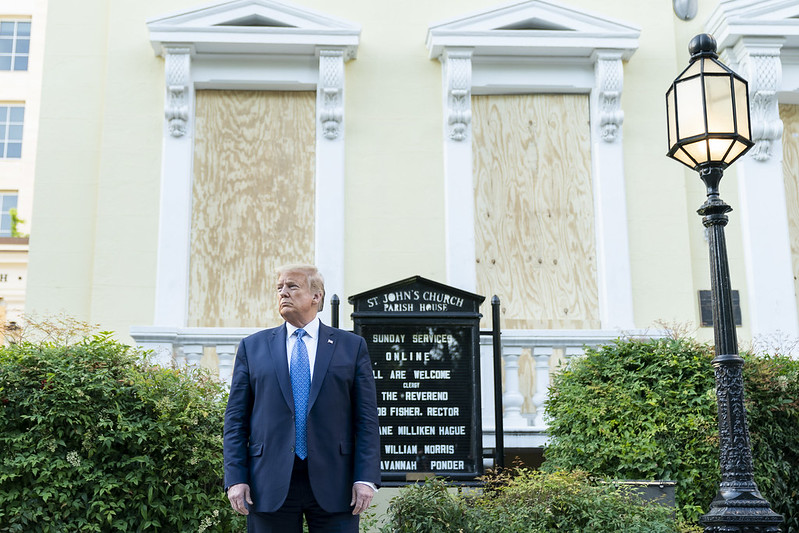
Reports of the death of White Christian America have been greatly exaggerated. White Christian political mobilization helped deliver Donald Trump to the U.S. presidency in 2016. White Christians self-identifying as “evangelical”—26% of voters in the 2016 election—voted for Trump in greater numbers than for any single candidate in the previous four presidential elections—a rate of 81%. White Catholics followed closely, voting for Trump at a rate of 60%. Rather than a momentary choice of a putative “lesser of two evils,” White evangelicals steadily increased their support for Trump and his policies throughout his presidency. They supported his constricting immigration and walled border policies (including separating refugee children from their asylum seeking parents), his prohibition of immigrants from various Muslim-majority countries (upheld by the Supreme Court in June 2018), and his deploying federal troops to violently quell peaceful protests in the Black Lives Matter uprisings of 2020. By the end of Trump’s presidency, the more frequently a White evangelical attended church, the stronger his or her support for the Trump agenda was likely to be. White evangelical Christian support surged to nearly the same proportion for Trump’s attempted re-election in 2020 (75%).
This upsurge of laser-focused, White, evangelical voting in the 2016 and 2020 elections has sparked an emerging industry of books that point to White Christian nationalism as the driver of this phenomenon.[1] And yet, the intermingling of religion and nationalism does not merely pertain to the backlash politics and voting patterns across two elections. The Trump-infused ethno-religious nationalism of White evangelicals is but the most recent upsurge of a political and cultural current that is traceable back at least sixty years, and indeed, much further. At the same time, exclusive—or even primary—focus upon whiteness and Christianity in these developments leaves multiple drivers of the ethno-religious nationalism of White evangelicals obscured from view. Attending to the sexual politics that fuel evangelical ethno-religious nationalism is equally indispensable. By sexual politics, I refer to the ways that gender norms, operations of power related to sexual identities, and policing of sexuality all function to legitimate and perpetuate ideologies, and are used to advance political agendas. Indeed, focusing on sexual politics uniquely illuminates the elective affinities between ethnicity, religion, and nationalism in this case. As a matter of historical emergence and development, sexual politics pervade the socio-political processes by which White evangelical ethno-religious nationalism has asserted and reasserted itself across recent decades—an animating and reanimating impulse, pattern, and logic that has surged and resurged for more than a half-century in White, Christian America. I describe this persistently recurring dynamic, pattern, and logic as zombie nationalism.
Part 1 in this blog series examines the ways that contemporary White evangelicals are religiously and culturally primed to embrace ethno-religious nationalism on the one hand, and its intermingling with Trump-driven conspiracy ideology (occurring most acutely in the apocalyptic and messianic features of the QAnon conspiracy movement), on the other. It diagnoses the nature and character of the apocalyptical and messianic fixations that inflect the nationalist proclivities of White evangelicals, and which render them distinctly susceptible to the siren-song of Trumpism and QAnon. I demonstrate how these ethno-religious and nationalist patterns, dynamics, and logic are intrinsic to modern U.S. evangelical Christianity, rather than peripheral or extrinsic. Part 2 of the series explicitly assesses the ways that race is inextricably interwoven into the ethno-religious nationalism of contemporary White evangelicals in its entirety, and is a distinct driver of its recent resurrection. Finally, Part 3 takes up the role of sexual politics as a recurring motivator of White evangelical ethno-religious nationalism since the 1960s.
Together, the three pieces that follow conduct a complex exposition and dissection of zombie nationalism. They historically contextualize and explicate its religious and cultural genealogy, its motivating commitments and distinctive temptations, and finally, the recurring patterns of sexual politics that have inspirited the resurrection of the White evangelical ethnoreligious nationalism of the Trump era.
[1] Robert Jones, The End of White Christian America; Jones, White Too Long: The Legacy of White Supremacy in American Christianity; Philip Gorski, “Why Evangelicals Voted for Trump”; Gorski, American Babylon: Christianity and Democracy Before and After Trump; Andrew Whitehead and Samuel Perry, Taking America Back for God: Christian Nationalism in the United States; Andrew Seidel, The Founding Myth: Why Christian Nationalism is Un-American; Sarah Posner, Unholy: Why White Evangelicals Worship at the Altar of Donald Trump; Katherine Stewart, The Power Worshippers; Anthea Butler, White Evangelical Racism: The Politics of Morality in America; Kristin Kobes du Mez, Jesus and John Wayne: How White Evangelicals Corrupted a Faith and Fractured a Nation.

